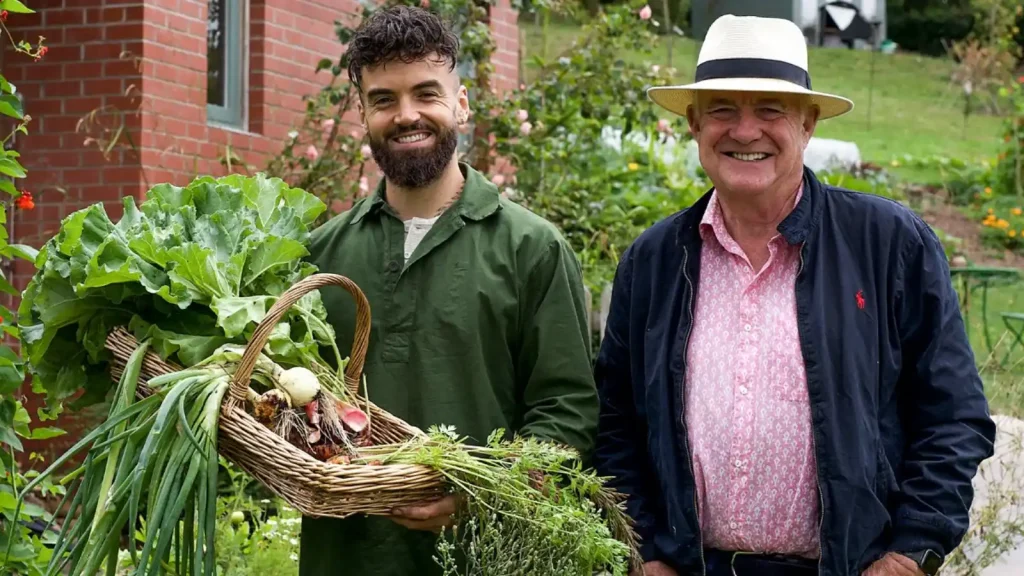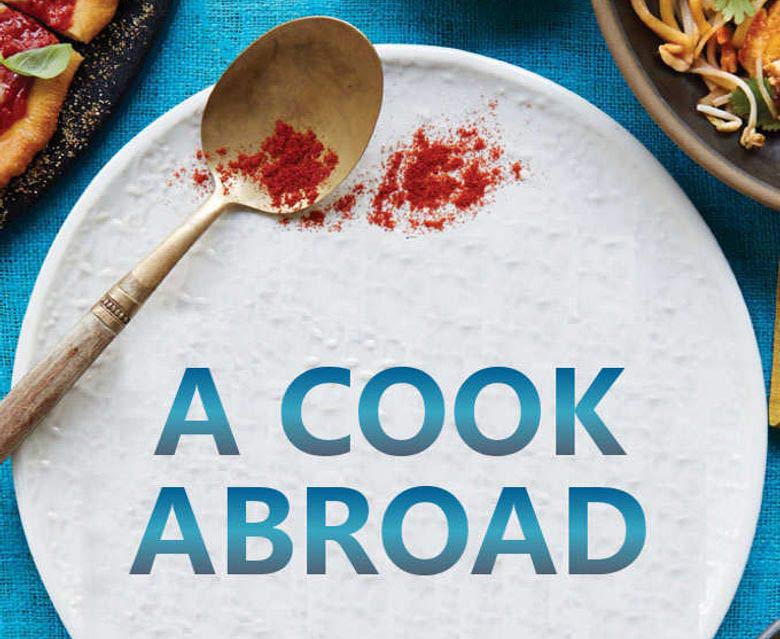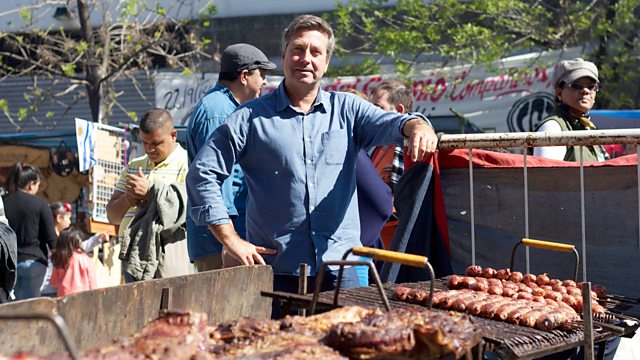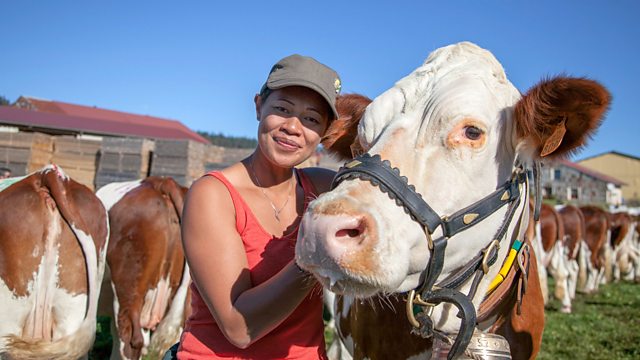Rick Stein’s Food Stories episode 6 – Wales: On the picturesque Gower Peninsula in Wales, renowned chef Rick Stein embarks on a culinary adventure that delves into the region’s unique food traditions and local produce. His journey begins with a visit to a local farmer who raises salt marsh lamb, a delicacy known for its distinct flavor, imparted by the coastal environment where the sheep graze. This farmer, however, faces an unusual challenge; remnants of World War II bombs still lie buried beneath the pastures. Fortunately, none of his sheep have fallen victim to these hidden dangers, allowing him to continue producing this exceptional meat.
Rick’s exploration of Welsh cuisine doesn’t stop there. He meets Gaz Oakley, a social media sensation celebrated for his innovative vegan recipes. Intrigued by Gaz’s approach, Rick is particularly eager to try his vegan rhubarb pizza, a dish that promises to challenge his traditional views on pizza toppings and vegan cuisine. This encounter showcases the diversity and creativity in modern Welsh food culture, blending traditional ingredients with contemporary culinary techniques.
As night falls, Rick’s adventure takes a turn towards the ancient and traditional. He ventures to the River Tywi to experience coracle fishing, a time-honored practice that dates back centuries. The coracle, a small, lightweight boat made of woven wood and waterproofed with tar, allows fishermen to navigate the river silently and efficiently. Rick hopes to catch a fish using this method, immersing himself in the historical practices that have shaped the region’s fishing heritage.
Back in the kitchen, Rick combines his culinary skills with the local ingredients he’s discovered. He prepares a succulent rack of lamb, demonstrating his mastery of meat cookery while highlighting the quality of the salt marsh lamb he’s encountered. Additionally, he shares his techniques for smoking sea trout, a method that enhances the fish’s natural flavors and pays homage to the traditional smoking methods used by Welsh fishermen.
Rick Stein’s Food Stories episode 6 – Wales
Throughout episode 6 of Rick Stein’s Food Stories, viewers are treated to a rich tapestry of Welsh food culture. From the rugged coastlines and pastoral landscapes to the innovative kitchens of contemporary chefs, Rick’s journey captures the essence of Wales’s culinary diversity. His encounters with local farmers, chefs, and traditional practices offer a deeper understanding of how history, environment, and innovation intersect to create a unique food narrative.
Rick’s enthusiasm for each new experience is palpable, and his ability to connect with the people and stories behind the food makes this episode a compelling exploration of Welsh gastronomy. Whether it’s the intriguing story of salt marsh lamb raised amidst wartime relics, the surprising delight of a vegan rhubarb pizza, or the serene tradition of coracle fishing, Rick Stein’s journey through Wales is a celebration of the region’s rich culinary heritage and its exciting future.
A Culinary Journey Through Wales with Rick Stein
Introducing Rick Stein’s Food Stories Series
Picture this: a renowned chef, with over half a century of culinary expertise, embarking on a gastronomic adventure across the picturesque landscapes of Wales. That’s precisely what Rick Stein offers in his captivating Food Stories series. With a twinkle in his eye and a spring in his step, Stein sets out to uncover the heart and soul of Welsh cuisine.
As the series unfolds, viewers are treated to a feast for the senses. From the rolling hills of Monmouthshire to the rugged coastlines of the Gower Peninsula, Stein’s journey is as much about the people and places as it is about the food. His infectious enthusiasm and genuine curiosity make each episode a delightful exploration of Welsh culinary traditions and innovations.
The Allure of Welsh Cuisine and Culture
Welsh cuisine, like a well-aged cheese, has developed its distinct flavor over centuries. It’s a tapestry woven from the threads of ancient Celtic traditions, Norman influences, and the bountiful produce of the land and sea. Stein, with his keen palate and storyteller’s flair, peels back the layers of this rich culinary heritage.
As he traverses the country, Stein encounters dishes that are as diverse as the Welsh landscape itself. From hearty cawl simmering in farmhouse kitchens to fresh seafood plucked from the Bristol Channel, each meal tells a story of Welsh identity and pride. But it’s not just about the past; Stein also shines a spotlight on the innovative chefs and producers who are reimagining Welsh cuisine for the 21st century.
A Glimpse into South Wales’ Gastronomic Landscape
South Wales, with its blend of urban energy and rural charm, serves as the perfect backdrop for Stein’s culinary exploration. Here, tradition and innovation dance a delicate waltz, creating a food scene that’s both deeply rooted and forward-looking. Stein’s journey takes him from bustling Cardiff markets to secluded coastal coves, each stop revealing a new facet of Welsh gastronomy.
In the valleys, he discovers artisanal cheese makers carrying on centuries-old traditions. Along the coast, he meets fishermen whose knowledge of the sea rivals that of any chef. And in the cities, he encounters a new generation of cooks blending global influences with Welsh ingredients to create something truly unique.
As Stein navigates this rich culinary landscape, he doesn’t just taste the food; he delves into the stories behind each dish. Through conversations with local producers, chefs, and food enthusiasts, he paints a vivid picture of a cuisine that’s deeply connected to its land, its history, and its people. It’s a journey that promises to tantalize taste buds and touch hearts in equal measure.
Innovative Plant-Based Cooking in Monmouthshire
Meeting Gaz Oakley: YouTube Sensation and Vegan Chef
Nestled in the rolling hills of Monmouthshire, a culinary revolution is quietly taking root. At the heart of this green uprising stands Gaz Oakley, a charismatic vegan chef whose YouTube channel has become a beacon for plant-based enthusiasts worldwide. As Rick Stein steps onto Gaz’s lush smallholding, he’s immediately struck by the vibrant energy radiating from both the land and its caretaker.
Gaz’s journey from traditional chef to vegan YouTube star is as colorful as the produce he grows. With a warm smile and soil-stained hands, he welcomes Rick into his world, where vegetables are the undisputed stars of the show. The contrast between Rick’s classical training and Gaz’s innovative approach sets the stage for a fascinating culinary dialogue that bridges generations and cooking philosophies.
Exploring Gaz’s Smallholding and Garden-to-Table Philosophy
As they stroll through rows of verdant vegetables and fragrant herbs, Gaz’s passion for his garden-to-table philosophy becomes palpable. Every plant tells a story, from the robust pumpkins he playfully sits on to the delicate edible flowers that will garnish his dishes. Rick, ever the curious culinary explorer, peppers Gaz with questions about his growing techniques and the challenges of maintaining such a diverse crop.
Gaz’s approach to farming is as much about sustainability as it is about flavor. He explains how companion planting and natural pest control methods not only protect his crops but also enhance their taste. This holistic view of food production resonates with Rick, who sees parallels with the sustainable fishing practices he’s championed throughout his career. As they harvest onions and rhubarb for the upcoming dish, the connection between land, cook, and plate becomes beautifully clear.
Creating the Welsh Garden Rarebit Pizza
Unique Ingredients and Flavor Combinations
In Gaz’s outdoor kitchen, the real magic begins to unfold. The Welsh Garden Rarebit Pizza is not just a dish; it’s a canvas for Gaz’s creativity and a testament to the bounty of his garden. As he begins to assemble the ingredients, Rick’s eyes widen at the unconventional combination of rhubarb, beetroot, and courgette destined for the pizza topping.
Gaz’s secret weapon in creating depth of flavor is revealed as he reaches for a jar of miso paste. This umami-rich ingredient, he explains, is key to replicating the savory notes often provided by cheese in traditional dishes. The interplay of sweet, sour, and savory elements promises a flavor profile that’s both familiar and excitingly new.
Techniques for Maximizing Plant-Based Flavors
As the pizza takes shape, Gaz shares his techniques for coaxing maximum flavor from plant-based ingredients. He demonstrates how slow-cooking onions releases their natural sweetness, and how a blend of nutritional yeast and plant milk creates a creamy, cheese-like sauce. Each step is a revelation to Rick, who watches with growing admiration for Gaz’s innovative approach.
The crowning glory of the pizza is a vibrant herb and citrus dressing, bursting with the freshness of just-picked garden herbs. As Gaz scatters edible flowers across the top, the pizza transforms into a work of art that’s almost too beautiful to eat. The aroma wafting from the wood-fired oven is tantalizing, a promise of the flavors to come.
Rick’s Verdict on Gaz’s Innovative Vegan Cuisine
With anticipation building, Rick takes his first bite of the Welsh Garden Rarebit Pizza. The moment of truth arrives, and the seasoned chef’s expression says it all. The explosion of flavors – the tang of rhubarb, the earthiness of beetroot, the creaminess of the rarebit sauce – creates a harmony that transcends the boundaries of traditional and plant-based cooking.
As they share the meal, Rick and Gaz discuss the future of plant-based cuisine. Rick acknowledges that while he’s not a vegan himself, he’s deeply impressed by the creativity and depth of flavor Gaz has achieved. This encounter has opened his eyes to the possibilities of plant-based cooking, proving that with skill and imagination, vegan cuisine can be just as satisfying and complex as any other.
Smoked sea trout with chive potato salad
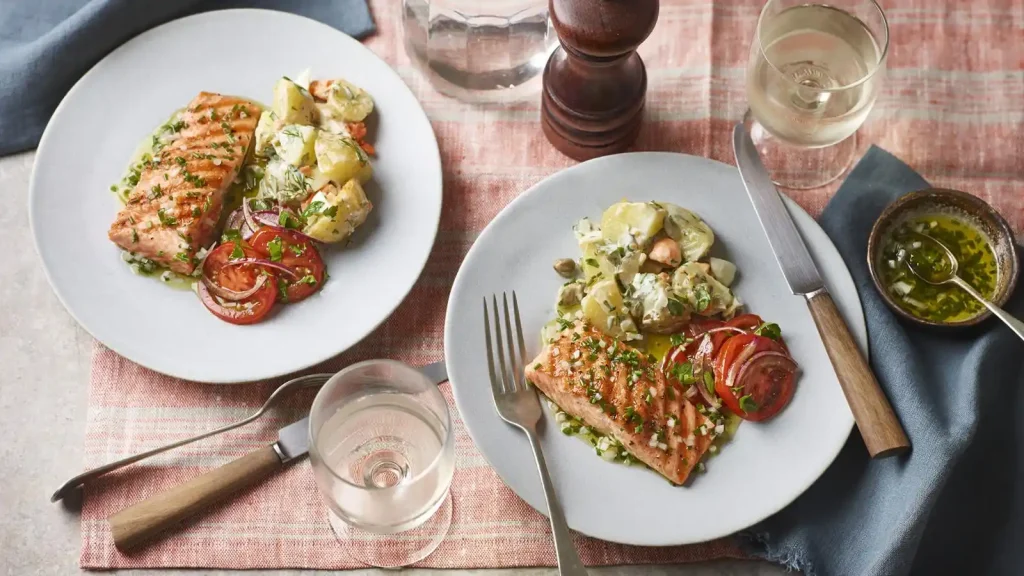
Use woodchips and a barbecue to cook your trout Stein-style, then serve with a quick chive dressing, luxury potato salad and plenty of fresh tomatoes.
Ingredients
For the chive dressing
- small bunch fresh chives
- 1 small shallot, finely chopped
- 90ml/3fl oz extra virgin olive oil
- 1 tbsp white wine vinegar
- ½ tsp salt
For the potato salad
- 1kg/2lb 4oz new potatoes such as Jersey Royals, scrubbed
- 2 banana shallots, finely chopped
- 2 hard-boiled eggs, peeled and chopped
- 1–2 tbsp capers
- 1–2 gherkins, depending on size, finely chopped
- 4 tbsp olive oil
- 1 tbsp red wine vinegar or sherry vinegar
- 2 tbsp mayonnaise
- small handful fresh parsley, chopped
- salt and freshly ground black pepper
For the tomato salad
- 6 tomatoes, finely sliced
- 1 small red onion, finely sliced
- pinch caster sugar
- 1 tbsp extra virgin olive oil
- 1 tsp sherry vinegar or balsamic vinegar
- handful fresh parsley or fresh basil, chopped or torn
Method:
- Spoon some of the chive dressing onto each plate and put the trout fillets on top. Garnish with the remaining chives and serve with the salads.
- To make a light brining liquid, dissolve the salt in 600ml/20fl oz water in a shallow dish. Add the trout fillet, cover and leave for 20 minutes. Drain and pat the fish dry.
- For the chive dressing, set aside four of the chives for a garnish and finely chop the remainder. Mix them with the shallot, olive oil, vinegar and salt.
- To make the potato salad, boil the potatoes in salted water, then drain and cool. Cut them into halves or quarters, depending on size, and mix with the remaining potato salad ingredients. Set aside.
- To make the tomato salad, arrange the sliced tomatoes on a serving plate and scatter over the sliced red onion. Season well with salt, pepper and sugar, then dress with oil and vinegar and garnish with the chopped herbs.
- To cook the trout, preheat a barbecue. Throw a handful of woodchips onto the coals and close the lid.
- Brush the pieces of smoked trout with a little olive oil. Place the pieces diagonally on the grill and cook for a couple of minutes on each side until lightly marked by the ridges and the centre of the fish is just warm.
Conclusion Rick Stein’s Food Stories episode 6 – Wales
Episode 6 of “Rick Stein’s Food Stories” in Wales is a vibrant celebration of the region’s culinary heritage and innovation. Through his encounters with local farmers, chefs, and traditional practices, Rick Stein offers viewers a captivating journey that underscores the unique blend of history, environment, and creativity that defines Welsh cuisine.
Rick’s visit to the Gower Peninsula reveals the remarkable salt marsh lamb, a product of the coastal grazing lands, with its unique flavor and the surprising backdrop of World War II remnants. This segment highlights the resilience and ingenuity of Welsh farmers, continuing to produce exceptional meat despite unusual challenges.
The episode’s exploration of modern Welsh cuisine is further enriched by Rick’s meeting with vegan chef Gaz Oakley. Gaz’s inventive approach to plant-based cooking, epitomized by his vegan rhubarb pizza, demonstrates the dynamic evolution of Welsh food culture. This encounter not only broadens Rick’s culinary horizons but also showcases the potential for traditional and modern cooking techniques to coexist harmoniously.
Rick’s adventure into the ancient practice of coracle fishing on the River Tywi adds a layer of historical depth to the episode. This immersive experience allows Rick to connect with the age-old methods that have shaped Welsh fishing traditions, providing a poignant contrast to the contemporary culinary innovations explored earlier.
Back in the kitchen, Rick’s preparation of salt marsh lamb and smoked sea trout serves as a testament to his culinary prowess and respect for local ingredients. These dishes, crafted with techniques that honor Welsh traditions, encapsulate the essence of the region’s gastronomic identity.
Overall, “Rick Stein’s Food Stories” episode 6 is a masterful portrayal of Welsh cuisine, capturing its rich diversity and the passionate individuals who sustain it. Through Rick’s engaging storytelling and culinary expertise, viewers gain a profound appreciation for the intricate tapestry of flavors, history, and innovation that make Welsh food truly extraordinary. This episode not only celebrates the culinary traditions of Wales but also looks forward to a future where these traditions continue to evolve and inspire.
F.A.Q.
Q.: What is the focus of Rick Stein’s Food Stories episode 6 in Wales?
A.: The episode focuses on exploring the unique food traditions and local produce of the Gower Peninsula in Wales. Renowned chef Rick Stein delves into the region’s culinary heritage, meeting local farmers and chefs, and experiencing traditional fishing methods.
Q.: What is special about the salt marsh lamb featured in the episode?
A.: The salt marsh lamb is renowned for its distinct flavor, which is imparted by the coastal environment where the sheep graze. The lamb is raised by a local farmer on pastures that contain remnants of World War II bombs, adding an unusual challenge to the farming process.
Q.: Who is Gaz Oakley, and what is his contribution to the episode?
A.: Gaz Oakley is a social media sensation known for his innovative vegan recipes. In the episode, Rick Stein meets him and tries his vegan rhubarb pizza, which showcases the creativity and diversity in modern Welsh food culture. Gaz’s approach blends traditional ingredients with contemporary culinary techniques.
Q.: What traditional fishing method does Rick Stein explore in this episode?
A.: Rick Stein explores coracle fishing on the River Tywi. This ancient practice involves using a small, lightweight boat made of woven wood and waterproofed with tar, allowing fishermen to navigate the river silently and efficiently. This method has been a part of Welsh fishing heritage for centuries.
Q.: How does Rick Stein incorporate local ingredients into his cooking in the episode?
A.: Back in the kitchen, Rick Stein uses the local ingredients he discovers during his journey. He prepares a succulent rack of lamb, highlighting the quality of the salt marsh lamb. Additionally, he shares his techniques for smoking sea trout, enhancing the fish’s natural flavors and paying homage to traditional Welsh smoking methods.
